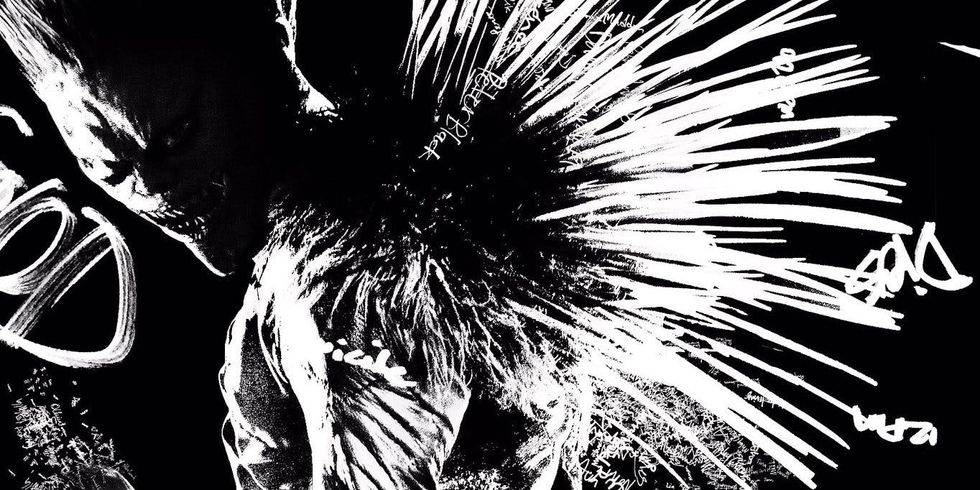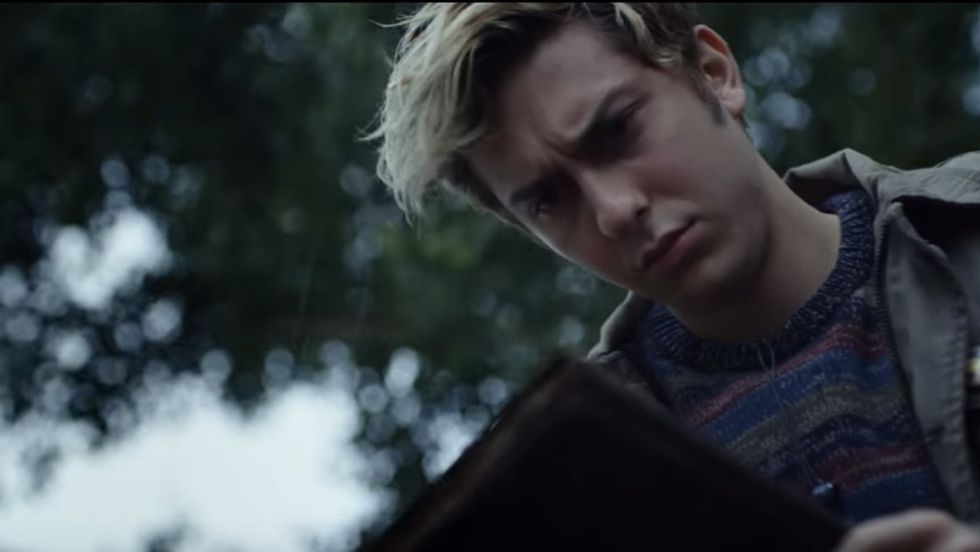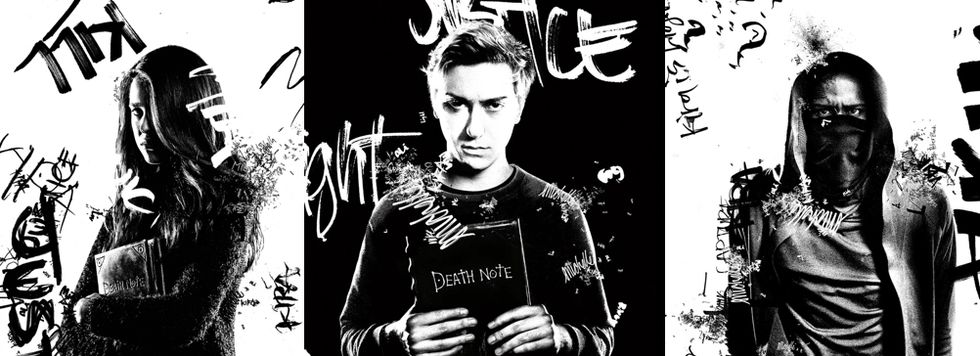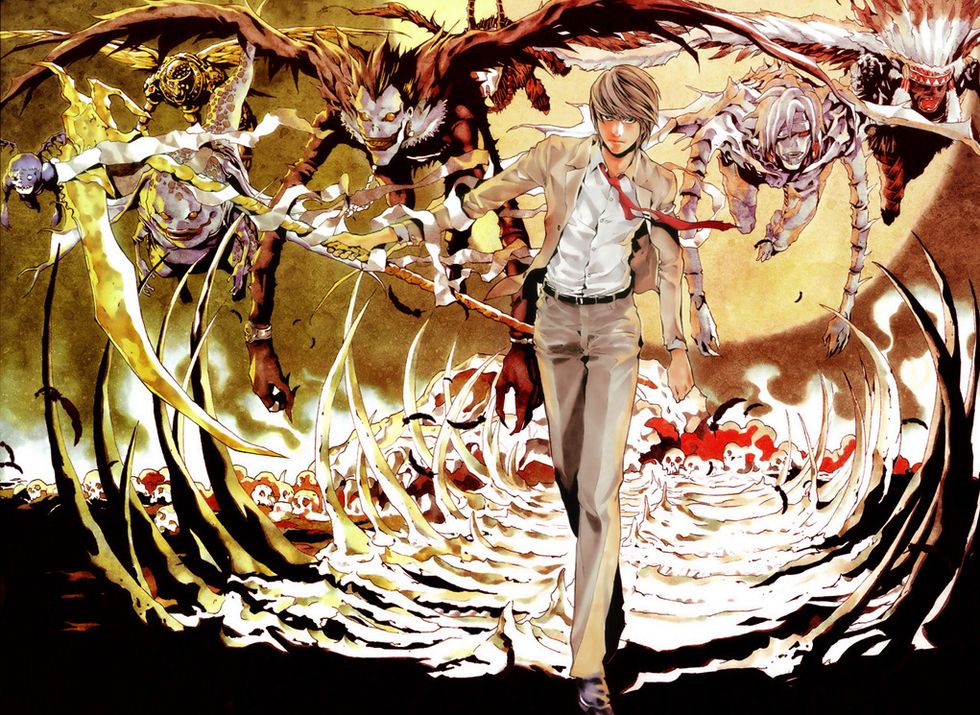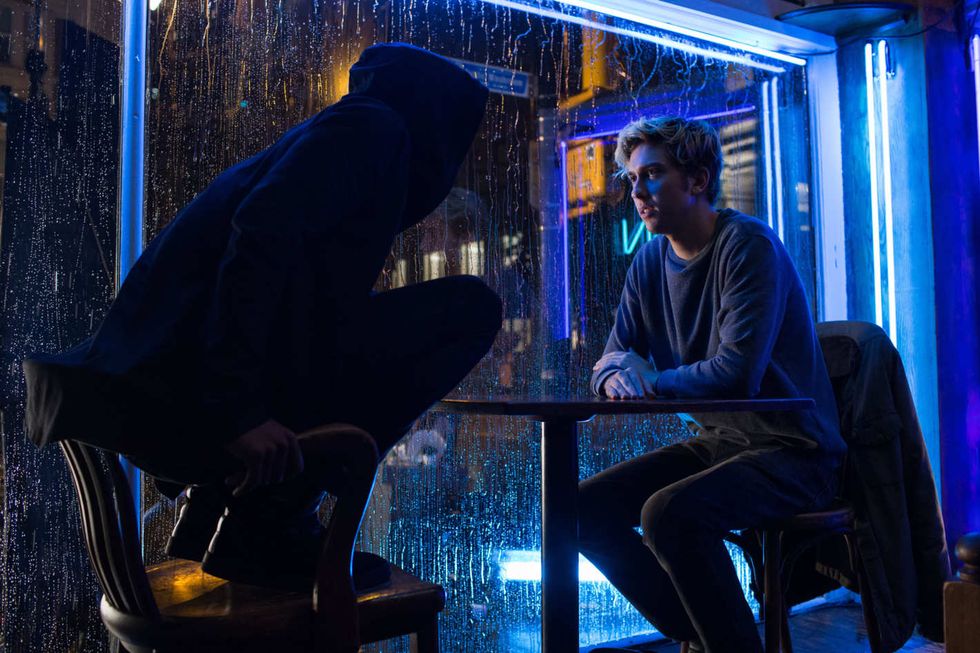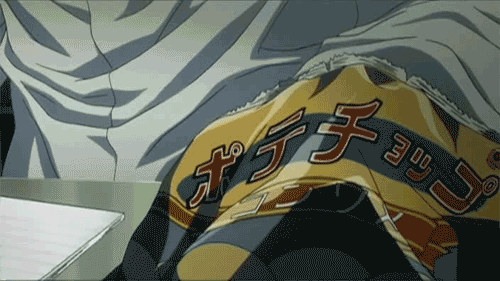Death Note is, without a doubt, the best live action American adaptation of an anime or manga ever made. Unfortunately, as a standalone product it falls just short of greatness.
For those unfamiliar with Takeshi Obata and Tsugumi Ohba's blockbuster series (or those who haven't seen it since it first aired on Toonami a decade ago), a quick refresher may be in order: Intelligent yet misanthropic high schooler Light (Nat Wolff) finds a notebook belonging to the shinigami Ryuk (Willem Dafoe) which has the power to kill anyone whose name is written in it. With the equally troubled Mia (Margaret Qualley) by his side, Light christens himself “Kira” and begins purging the world of injustice, one name at a time. Unfortunately for the pair, a detective known only as L (Lakeith Stanfield) joins forces with Light's police chief father (Shea Wingham) to bring Kira to justice. Needless to say, all hell breaks loose as Light and L engage in a battle of wits, twists, and turns.
As a longtime fan of the series I’m happy to report that the film averts being an absolute trainwreck - in fact, it’s actually pretty good! Casting is solid for the most part, and as an obligatory aside any concerns about whitewashing seem moot given that everyone is so different from their original versions anyway. Wolff is clearly the weak link, but Dafoe and Stanfield make up for it in spades with standout performances. Special mention must also go to Qualley, whose take on Mia is leagues better than all previous incarnations of Misa Amane. Some questionable gender politics towards the climax notwithstanding, I appreciated how the film allows Mia to stand as Light’s equal rather than a pawn who gives herself over to him with ease.
On a technical front, it’s clear how much respect director Adam Wingard has for the original material. The cinematography, with its abundance of canted angles and bursts of kinetic action, draws heavily from Tetsuro Araki’s work on the anime adaptation and underscores the hypnotic, efficient, confident approach to storytelling. Freeze-frame bonuses abound in every frame, especially when the Death Note itself is the center of attention. The film even stays true to the spotty pacing of pretty much every Death Note adaptation! Jarring tone shifts from camp to teen melodrama to psychothriller, rules that come in and out of focus as the plot demands, and too much time spent on certain elements (Light and Mia’s relationship) when others really needed to be elaborated on (the Light/L conflict) all threaten to bring the fun to a crashing halt. But somehow it all comes together to form an intriguing and hypnotic product, even if it glosses over a few plot points too many for newbies to keep up.
Given everything the film does right, Wingard should have had a home run. And yet, Death Note's fundamental misunderstanding of Light himself makes the whole film collapse on itself thematically. Light Turner is a misunderstood, whiny loner with a troubled home life - a far cry from Light Yagami’s persona as a popular, practically perfect straight-A student with a hidden sadistic streak and a massive god complex. And while both become killers, only one truly inspires fear in the viewer... and ironically enough, it isn't the one who decides to decapitate his classmate to test out the Death Note.
The terror of Death Note comes from its open interrogation of the masquerade of morality and justice, both on an individual and societal level. The stark contrast between Light and Kira (at least in the original) alludes to the performative nature of “goodness”; by playing the part of a passionate student who wishes to follow in his father’s footsteps Light is able to obtain information and evade suspicion, and in the rare instance someone discovers the truth he shows his true colors and kills them. L proves to be just as capable a performer of justice as Light, using his detective persona to justify both his tendency to put colleagues in dangerous situations without their consent and his true motives for capturing Kira. Indeed, with the sole exception of Light’s father and some of the minor KSIU members, the Death Note corrupts every single person involved in the Kira case and causes their masquerades of decency to crumble. Death Note argues, then, that when given the chance to punish others with impunity even the best of us will savor the chance to become hypocrites or play god, despite the fact that the definition of justice itself is dialectical and subject to change.
And that’s the fatal flaw of Netflix's take on Death Note - whereas the original dares to ask (and even demonstrates) how a seemingly well-adjusted and successful individual could devolve into a killer, Wingard’s interpretation is merely content to examine what would happen if a kid who likely would’ve committed a school shooting anyway used a notebook to kill people instead. (Seriously, how has a kid with a murdered mom and untreated “behavioral issues” and frequent black eyes from bullies not been flagged by guidance yet?) As a result, we as an audience aren’t forced to consider what justice truly means, or if we’d be any better than Light at preserving our morality if we were given the power of the Death Note. Even Wingard seems to feel ambivalent about making Light unambiguously evil like his original counterpart, despite all signs pointing to yes, this guy is seriously maladjusted and needs to be stopped.
The lack of cerebral depth affects other areas of the film too, as the wild gambits & intellectual maneuvers which made the series so endearing are conspicuously absent for most of the film. Instead, we get scenes of Light and Mia reading and discussing the Death Note in public, L making incredible leaps in logic that he never bothers to explain, and James ignoring the many obvious signs that his son knows something about Kira. The gambits in the final third are glorious and evoke the manga at its very best, but without any foreshadowing everything feels unearned and contrived.
Death Note is a fun but significantly dumbed down version of a beloved property, which is better than most people expected. If you’re a fan of CW-style teen dramas, campy genre cinema, or horror (and don’t mind blatant cliffhangers and/or sequel hooks) you’ll have a good time. As for those who can’t stand either of those things, or just want something with a lot of philosophical themes to ponder, now’s a good a time as any to binge the anime on Netflix or Hulu... preferably while eating potato chips.

